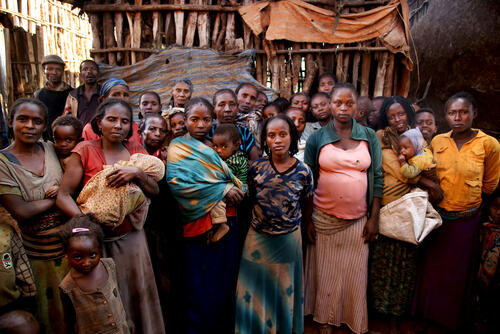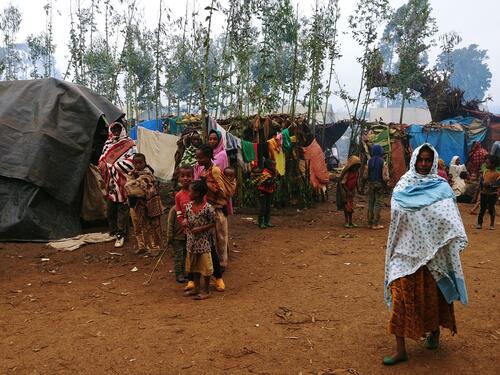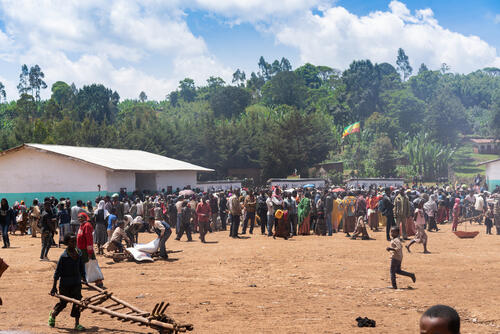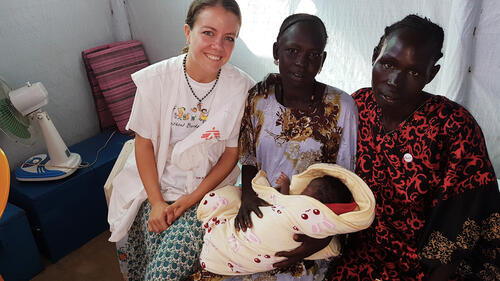First-hand accounts from patients and staff in Gedeo and Guji, Ethiopia, during MSF’s emergency response to the recent displacement crisis.
Ethnic violence escalated in May and hundreds of thousands of people fled their homes, leaving them without basic services and putting their health at risk.
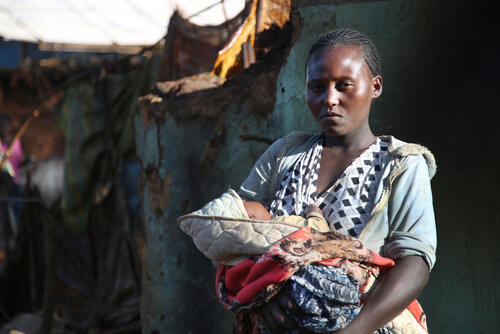
Felekeche, 25, is from Dilla, in Gedeo, in Ethiopia’s SNNP region
“I came to Guji eight years ago, just before marrying my husband, who is also from Gedeo. When I arrived, my sister was already living in Ewaabay town.
Our life was good. We had peace, lived in harmony with our neighbours and cultivated coffee and false bananas to earn some money. We had enough to live on.
In May, after the conflict started, our house was burnt down and destroyed. At first, we moved to a camp [for internally displaced people]. From time to time we found work as daily labourers.
The situation has been very changeable and volatile. Sometimes it seems that things are going well again, sometimes they take a turn for the worse. We have been hungry, and we had no food. We had to go to Kercha [a bigger town] to get aid and provisions. Now I am living with relatives in a house with five other people.
My husband left 15 days ago for a coffee plantation a few km away to work on the harvest so as to support our family. While doing the harvest, he felt afraid and moved to Gedeo. I’m thinking of going there to join him, but I have nothing and no money.
If things don’t improve, there will be no other option. Luckily my baby, who was born in the midst of the violence, is healthy. I gave birth in the camp, without medical assistance but helped by my husband.”
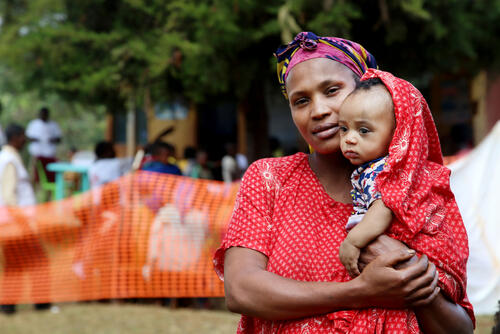
Nigata Gremede, 26, is from Guji in Ethiopia’s Oromia region. She has five children aged from six months to 10 years.
“My father, my husband and many of my relatives are from Gedeo, but I was born in Guji and for the past 12 years, since I got married, we have lived in this kebele [municipality].
We used to cultivate various crops and sell our coffee beans after each harvest. We have donkeys to carry things, but mainly to fetch water, as it takes up to an hour to reach the water source.
I used to go there myself, but now my eldest son is fetching the water as I have to look after the baby. I’ve come to the mobile clinic to get him vaccinated. Also, I’m feeling weak because of the flu. I hope that the medicine I’ve been given will make me feel better soon.
Before the conflict, everyone lived together and relations among neighbours were good, but some bridges have been broken now.
Often I don’t feel comfortable leaving my house alone. I feel afraid because some women have suffered sexual violence. Some of the cultivation areas were burnt and destroyed, and I lost my crops.
Sometimes I feel hopeless. I have been hired as a daily worker to make coffee, but it gives me very little money.
We are also renting some land and hopefully we will be able to farm again. We are planning to grow wheat and barley. I would really like to be a merchant and sell pepper and other products along with my husband.
Today we are getting food support from NGOs, while the medical care we’ve received has been helpful.
We have to try and help each other again in the community, like we used to, and share what we have. We had good friends and neighbours. Sometimes we ate together with freedom and no tensions.”
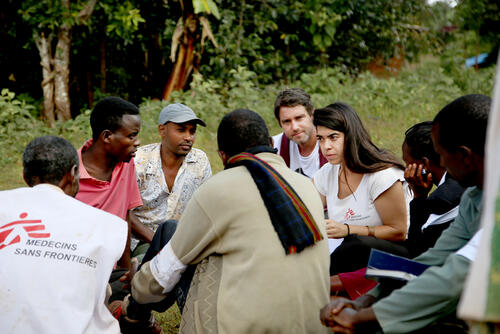
People have helped and protected each other. This commitment doesn’t show up in the medical statistics.María García, MSF health promoter
María García has worked with MSF as a health promoter throughout the crisis in Gedeo and Guji, and in various MSF emergency responses in Ethiopia for the past year or more
“People from different ethnic groups in this region often used to intermarry and their communities lived together. But then violence broke out.
June was really the turning point in Kercha town, in Guji, in Ethiopia’s Oromia region. I remember a colleague of mine with extensive experience in humanitarian emergencies saying in July that this was one of the worst situations he had seen in his life.
Many people were sick and had nothing. Children were suffering from pneumonia. The hospital was full. We had to work as fast as possible.
In the early weeks of the conflict, people took over three church compounds in Kercha to shelter there. The camps were in a dire state.
In August we did a mass vaccination campaign. Soon afterwards, the authorities started taking people back to the areas from which they had fled.
For me, the most impressive thing [about the response to the crisis] has been the commitment of our community health workers, who felt they should be an example and provide assistance to their communities. As a result, people have helped and protected each other. This commitment doesn’t show up in the medical statistics.
Today you still get the feeling that a small rumour could escalate and lead people to cross a border again. But I also see many people making an effort to prevent these kinds of situation.
In the first phase of the crisis, many people sheltered in camps for internally displaced people. Later they started to construct houses, even when they only had very basic materials.
Even in the worst situations, you see many good things happening.”
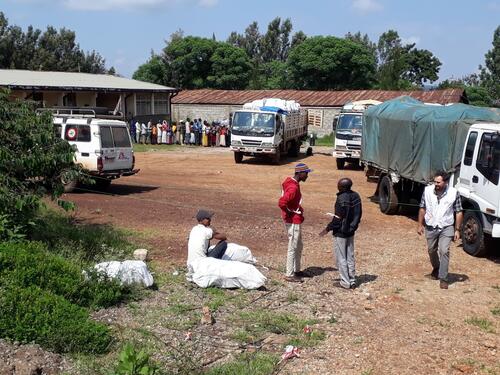
People who fled their homes said there was no warningJosh Rosenstein, MSF emergency coordinator in Dilla town, Gedeo
Josh Rosenstein was MSF’s emergency coordinator in Dilla town, Gedeo zone of SNNP region
“In early August, as we drove through hamlets and villages, up to 75 per cent of the homes we saw were damaged. Some houses were missing their tin roofs, others were missing their mud or clay walls.
We also saw homes that no longer existed – where all that remained was a shadow on the ground of darker earth that had not yet been scorched by the sun. This was testament to the ferocity and intensity of the tensions.
I spoke to many people who had fled their homes. They told me there was no warning. Although there had been discontent before, and there had been rumblings for some weeks, for them it began suddenly.
One night there was a commotion, they were woken up and the neighbours, who they had trusted for years, were violently chasing them out of town. Many fled at night, in a rush, in their underwear, without shoes, with only their children in their arms.
We heard reports suggesting significant numbers of people lost their lives in the early stages of the conflict.
People fled over hilly terrain, avoiding roads, avoiding villages, because they no longer knew who they could trust. They arrived at warehouses, schools, factories and they had nothing, not even the basics of water, food or medical care. That is what we saw when we first arrived.
There were different waves of violence and displacement. Sometimes people returned home to find that their house was not secure, that conditions were not right to stay there, that there was still animosity between them and their neighbours, who chased them out, and so they were displaced again.
The context changed constantly, which made it incredibly difficult to respond. Early on in the conflict, the international community knew where people were and roughly how many. At the start there were tens of camps or sites; later on there were hundreds, if not thousands.
People were in more remote places, so were harder to reach. It was difficult enough to provide assistance in one site in one area, but later we assisted displaced people spread out across hundreds of sites.”



